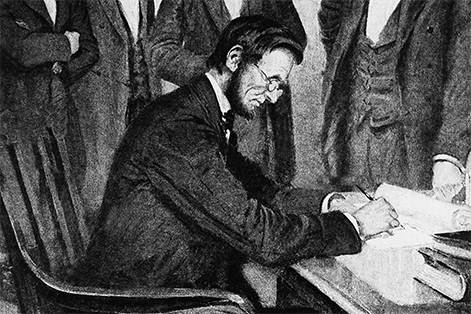| |

Like
most
Americans
then and
now,
Abraham
Lincoln
began
his New
Year’s
day over
a 150
years
ago by
attending
a party,
in this
case his
own.
|
| |
The
spirit
of the
Emancipation
Proclamation
is under
attack
again
today
Op-Ed by
Jesse
Jackson
Tell Us
USA News
Network
CHICAGO
-
Wednesday,
Jan. 1,
begins
the new
year. It
also
marks
the
anniversary
of a new
America.
On
Jan. 1,
1863, as
the
Civil
War, the
bloodiest
of
America’s
wars,
approached
the end
of its
second
year,
President
Abraham
Lincoln
issued
the
Emancipation
Proclamation,
declaring
“that
all
persons
held as
slaves”
within
the
rebellious
states
“are and
henceforward
shall be
free.”
The
Proclamation
was
limited
to fit
wartime
necessities.
It
applied
only to
the
states
that had
seceded
from and
were at
war with
the
United
States,
leaving
slavery
untouched
in loyal
border
states.
It also
exempted
the
parts of
the
Confederacy
that had
already
come
under
Northern
control.
And, of
course,
the
freedom
it
promised
depended
on the
victory
of the
North.
Yet,
the
Proclamation’s
effect
was far
more
expansive
than its
terms.
It
transformed
the war
into a
war of
freedom.
As the
U.S.
Archives
summarizes,
“Every
advance
of
federal
troops
expanded
the
domain
of
freedom.”
And of
course,
it
dramatically
aided
the
Union
cause,
with
nearly
200,000
black
soldiers
and
sailors
fighting
for the
Union.
The
Proclamation
was the
beginning.
Upon
victory,
Congress
passed
three
amendments
to the
Constitution
— the
13th,
14th and
15th
Amendments
—
designed
to
finish
the job
of
transforming
the
country
that
was, in
the
words of
Abraham
Lincoln,
“half
slave
and half
free” to
one in
which
all were
guaranteed
— under
the
Constitution
— the”
blessings
of
liberty.”
The
13th
Amendment
outlawed
slavery
and
involuntary
servitude;
the 14th
began to
define
the
rights
of
citizens
and
guaranteed
equal
protection
under
the law;
the 15th
prohibited
discrimination
in the
right to
vote on
the
basis of
“race,
color,
or
previous
condition
of
servitude.”
(Ironically,
the
Constitution
still
does not
guarantee
the
right to
vote to
all).
The
amendments,
forced
upon the
defeated
Southern
states
as a
condition
for
re-entry
into the
Union,
launched
the
reconstruction
that
sought
for a
few
short
years to
bring
the
country
together.
Newly
empowered
blacks
joined
with
progressive
whites
to build
coalitions
that
transformed
state
constitutions,
guaranteeing
the
right to
education,
launching
programs
to
provide
more
equal
justice
under
the law.
Sadly,
Reconstruction
met with
fierce
reaction
across
the
South.
Segregation
masters
succeeded
the
slave
masters.
The Ku
Klux
Klan,
formed
by the
elites
of
Southern
communities,
terrorized
newly
freed
blacks.
The
right to
vote was
sabotaged
by
various
tricks
and
traps,
from the
poll tax
to
unequally
administered
tests on
the
Constitution,
to
simple
threat
and
terror.
In 1896,
the
Supreme
Court to
its
shame
ruled
that
apartheid
— the
mythic
“separate
but
equal”
standard
— was
legal in
the
United
States.
By the
turn of
the
century,
segregation
was the
law of
the
land.
It
took 100
years
and the
historic
civil
rights
movement
to
overturn
that
reaction,
and to
begin to
reclaim
the
promise
of equal
justice
under
the law
and the
revive
the
right to
vote.
The
civil
rights
struggle,
which
united
the
movement
of
courageous
citizens
on the
ground
with the
force of
Lyndon
Johnson
in the
White
House,
produced,
among
other
legislation,
the
Civil
Rights
Act and
the
Voting
Rights
Act that
brought
America
closer
to its
promise.
Today,
we once
more see
the
stirrings
of
reaction
against
that
reconstruction.
Racial
division,
stoked
cynically
from the
highest
offices
in the
land,
once
more is
on the
rise.
African
Americans,
Latinos,
Jews,
Muslims,
gays,
women —
all once
more
feel the
rise of
resentment
and
often of
hate.
The
Supreme
Court
has
gutted a
critical
part of
the
Voting
Rights
Act.
States
under
reactionary
governors
are
inventing
new ways
to
restrict
access
to the
vote.
Will
this
reaction
be as
successful
as that
which
undermined
the
promise
of the
Emancipation
Proclamation?
America,
I
believe,
is
better
than
that.
Our
democracy
is
stronger
than it
was
then. We
can
mobilize
and vote
in large
numbers
to keep
expanding
the
domain
of
freedom.
On
this
Jan. 1,
let us
remember
the
Emancipation
Proclamation,
signed
by the
greatest
of our
presidents,
a
Republican,
and
devote
ourselves
to
redeeming
its
promise.

|
| |
|
|
|
|